#suzanne cooper
Text
im gonna be here for hours
#* &. david nolan.#* &. regina mills.#* &. aleida diaz.#* &. dayanara diaz.#* &. erica 'yoga' jones.#* &. galina 'red' reznikov.#* &. gloria mendoza.#* &. nicky nichols.#* &. norma romano.#* &. sophia burset.#* &. suzanne 'crazy eyes' warren.#* &. ray hall.#* &. alice smith.#* &. archie andrews.#* &. betty cooper.#* &. cheryl blossom.#* &. penelope blossom.#* &. veronica lodge.
2 notes
·
View notes
Text


The times, they have been a changin'…
Anderson Cooper and Andy Cohen's NYE is like when the mom hosting book club night realizes they've run out of boxed wine and the baby is running around the house with a diaper on his head screaming, "You have penis breath," to all the ladies.
#New Year's 2023#Andy Cohen#Anderson Cooper#Dick Clark#Suzanne Somers#Any Gibb#KC and Sunshine Band#1978#2022#2023
0 notes
Text
State Visit from Finland
On 23–24 April 2024, the President of the Republic of Finland, Alexander Stubb, and their wife, Suzanne Innes-Stubb, will pay a state visit to Sweden at the invitation of H.M. The King. The President is accompanied by a delegation of government and business representatives.
The tradition of a newly elected Finnish president making his first state visit to Sweden expresses the special relationship between Sweden and Finland. The state visit confirms the close connection and togetherness.
The purpose of the visit is to continue developing and deepening the very close cooperation within all areas of society, above all foreign, security and defence policy cooperation. The new security situation in our surrounding area makes this relationship even more significant. The visit also aims to work for an even closer collaboration between Swedish and Finnish businesses to promote trade and investments and jointly strengthen global competitiveness. Student and research exchange and cultural issues are other areas that will be touched upon during the visit.
The state visit will be the seventh incoming state visit from Finland since the King's accession to the throne. The last one took place in 2022 when President Niinistö visited Sweden. The King has made five outgoing state visits to Finland, the most recent of which took place in 2015.
The visit takes place over two days in Stockholm and Gothenburg.
Translation and editing for clarity is done by yours truly; the original press release in Swedish can be found here.
13 notes
·
View notes
Photo
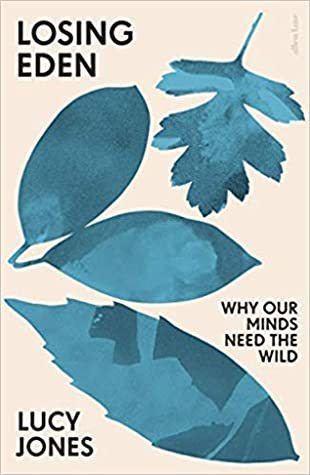

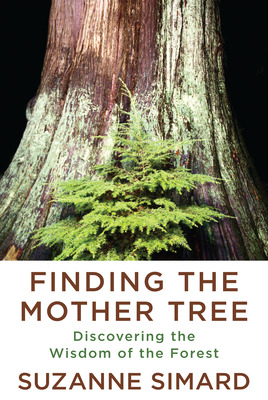

One with Nature: Connecting with the Natural World
Losing Eden: Why Our Minds Need the Wild by Lucy Jones
Today many of us live indoor lives, disconnected from the natural world as never before. And yet nature remains deeply ingrained in our language, culture and consciousness. For centuries, we have acted on an intuitive sense that we need communion with the wild to feel well. Now, in the moment of our great migration away from the rest of nature, more and more scientific evidence is emerging to confirm its place at the heart of our psychological wellbeing. So what happens, asks acclaimed journalist Lucy Jones, as we lose our bond with the natural world--might we also be losing part of ourselves?
Delicately observed and rigorously researched, Losing Eden is an enthralling journey through this new research, exploring how and why connecting with the living world can so drastically affect our health. Travelling from forest schools in East London, to the Svalbard Global Seed Vault, via Poland's primeval woodlands, Californian laboratories and ecotherapists' couches, Jones takes us to the cutting edge of human biology, neuroscience and psychology, and discovers new ways of understanding our increasingly dysfunctional relationship with the earth. Urgent and uplifting, Losing Eden is a rallying cry for a wilder way of life - for finding asylum in the soil and joy in the trees - which might just help us to save the living planet, as well as ourselves, from a future of ecological grief.
Braiding Sweetgrass: Indigenous Wisdom, Scientific Knowledge, and the Teachings of Plants by Robin Wall Kimmerer
As a botanist, Robin Wall Kimmerer has been trained to ask questions of nature with the tools of science. As a member of the Citizen Potawatomi Nation, she embraces the notion that plants and animals are our oldest teachers. In Braiding Sweetgrass, Kimmerer brings these lenses of knowledge together to show that the awakening of a wider ecological consciousness requires the acknowledgment and celebration of our reciprocal relationship with the rest of the living world. For only when we can hear the languages of other beings are we capable of understanding the generosity of the earth, and learning to give our own gifts in return.
Finding the Mother Tree: Discovering the Wisdom of the Forest by Suzanne Simard
From the world's leading forest ecologist who forever changed how people view trees and their connections to one another and to other living things in the forest--a moving, deeply personal journey of discovery.
Suzanne Simard is a pioneer on the frontier of plant communication and intelligence; she's been compared to Rachel Carson, hailed as a scientist who conveys complex, technical ideas in a way that is dazzling and profound. Her work has influenced filmmakers (the Tree of Souls of James Cameron's Avatar) and her TED talks have been viewed by more than 10 million people worldwide.
Now, in her first book, Simard brings us into her world, the intimate world of the trees, in which she brilliantly illuminates the fascinating and vital truths--that trees are not simply the source of timber or pulp, but are a complex, interdependent circle of life; that forests are social, cooperative creatures connected through underground networks by which trees communicate their vitality and vulnerabilities with communal lives not that different from our own.
The Vanishing Face of Gaia: A Final Warning by James E. Lovelock
Celebrities drive hybrids, Al Gore won the Nobel Peace Prize, and supermarkets carry no end of so-called “green” products. And yet the environmental crisis is only getting worse. In The Vanishing Face of Gaia, the eminent scientist James Lovelock argues that the earth is lurching ever closer to a permanent “hot state” – and much more quickly than most specialists think. There is nothing humans can do to reverse the process; the planet is simply too overpopulated to halt its own destruction by greenhouse gases.In order to survive, mankind must start preparing now for life on a radically changed planet. The meliorist approach outlined in the Kyoto Treaty must be abandoned in favor of nuclear energy and aggressive agricultural development on the small areas of earth that will remain arable.
A reluctant jeremiad from one of the environmental movement’s elder statesmen, The Vanishing Face of Gaia offers an essential wake-up call for the human race.
#nonfiction#non-fiction#non-fiction books#history#Environment#biology#botany#nature#natural science#sustainability#science#ecology#to read#tbr#booklr#book blog#reading recommendations#Book Recommendations#book recs#library books#informed reading#reading for a better world
215 notes
·
View notes
Text
Book Review - First Blood by David Morrell
Long before I knew there was a book called First Blood, I knew “Rambo” meant someone who went into situations with guns blazing, like Die Hard or John Wick. After reading it, I see how film and pop culture have turned the character into something strikingly different. I have never seen the movies, so my review will speak only of the book First Blood. What made the book so special? Would it be as well-known without the film adaptations? Thrillers are naturally inclined to be popular, just like the romance genre, for titillating the audience’s emotions and allowing them to vicariously experience adrenaline. Despite the fact the thriller genre tends to be more plot than character driven, First Blood is unique in the action being completely motivated by the characters’ emotions. This made for a powerful story I could not put down, a modern revenge tragedy, whose popularity was certainly due to its relevance to contemporary issues.
I was excited to learn David Morrell was a Penn State alum, which is not my alma mater but is my state! My copy contained a foreword from the author, in which he explained the idea came from flipping through the news (just like how Suzanne Collins got the idea for The Hunger Games). He saw coverage of the Vietnam war, violence in inner city America, and a story in which police officers arrested ‘troublemaker’ hippies, shaved their hair, and dropped them off in the middle of the desert. He thought, “What if I wrote a book in which the Vietnam war literally came home to America?” (Morrell 3)
On the surface level, it’s a story about men shooting each other, like a Western. Exciting enough for that target audience, but First Blood isn’t any thriller. Deeper, it’s an anti-war reflection that caused division within the divided society it was written for. First Blood was highly relevant to the issues of the 1970s and contains complex, compelling characters in which you really can’t tell who was the protagonist and who was the antagonist.
Neither Rambo nor Teasle are the “good guy” and I felt like we weren’t supposed to be rooting for either of them. Both are larger than life characters, but especially Rambo. See: the connotation of the name in pop culture. No one should be able to keep running with that many injuries, dehydration, broken ribs, fevers, bat bites, and bullet wounds. I would think no one can kill over a dozen men in a quick ambush, during a flash flood, with aforementioned broken ribs. Teasle similarly keeps going despite witnessing the death of his father figure, nearly having a heart attack, and finally dragging himself along with a hole in his abdomen.
As a side note to break up this gritty review about a gritty book: we got a solid appearance description for Rambo, but I don’t remember one for Teasle, and towards the end of the book I realized I should have been imagining him with a notable moustache because it was the 1970s. I must also mention, the sexism was very 1970s. There's the part where Teasle is thinking about Orval's wife and wondering who she'll cook and clean for with her husband dead. Because all women are good for is housework, right? Terrible.
I’ll admit didn’t care for Teasle, coming from the perspective of someone who doesn’t like cops who harass and arrest people for non-crimes such as ‘loitering’ just because they want an ego trip. It happens too often in the real world. No matter what Teasle said about the law or wanting a distraction from his divorce, I read between the lines to know he was ruthless in his pursuit because Rambo had disrespected him. Similarly, Rambo snapped not only because of PTSD and seeing the prison cell; he was refusing to cooperate even before getting arrested because Teasle had disrespected him. I was almost rooting for Rambo to escape, though I knew he wouldn’t. I felt like the Green Beret, proud of how skilled he was. I knew Rambo was not thinking straight, that to him, he was in Vietnam and not Kentucky. It made him a little easier for me to sympathize with than the police officer, though he lost most of my sympathy once his priority stopped being escape and he started hunting for sport.
Even though I agreed with absolutely nothing the characters were doing, I understood every single choice they made and the pathos behind it. Their characterizations were crystal clear, which is something I admire as a fellow writer. Furthermore, I was delighted by the parallel structure of the story. It begins with Rambo and Teasle meeting at a gas station where they butt heads over who is allowed into the town, and it ends with gas stations exploding while Rambo and Teasle hunt each other through town. The ending was cathartic. Despite me not liking either character, I understood both of them, which had me choked up at the end. It could not have ended any other way. This feels bizarre to say, but I was happy the book had the finale it did. I would have been disappointed if it ended in any other way but them killing each other. Their stories were too connected at that point. The hunt becomes a type of love. Teasle was seeing through “the kid’s” eyes. They were both so far past the point of no return, their entire lives narrowed down to one purpose—to defeat the other—so that once their goal was done, they’d have nothing else to live for/no more purpose as a character.
What was the purpose of all of it? All those men died in the woods and the town was burned down, just because a cop harassed a man who was doing nothing but walking down the street? There was no point to the level of bloodshed, but this is a book about the Vietnam war, and it carries the theme that there was no purpose for the war. The scene resonated with me with the Green Beret training officer saying he hated the war, but did his job because he wanted to teach the kids the government sent into the slaughter to stay alive longer. Teasle and Rambo both grew up being taught how to kill and little else. They both brought the war to America.
It’s a tragedy, through and through. It’s Shakespearean. Act I: Rambo is arrested and starts to run. Act II, the rising action: Teasle begins pursuit. Act III, the climax: Rambo kills everyone but Teasle. Act IV, the falling action: Rambo continues to evade pursuit. Act V, the conclusion: the fight in the town and the death of the tragic heroes. Rambo and Teasle both occupy an honored position in society, holding medals, they both have a tragic flaw—the ego/hubris of the classics—which causes the tragedy to happen, and they meet an end they cannot be restored from—death.
7 notes
·
View notes
Text
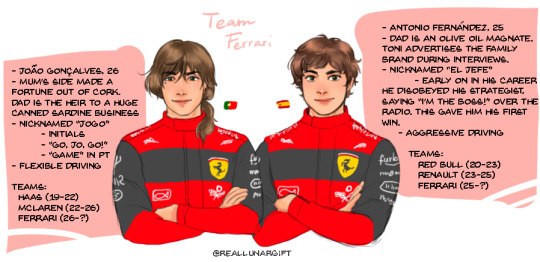
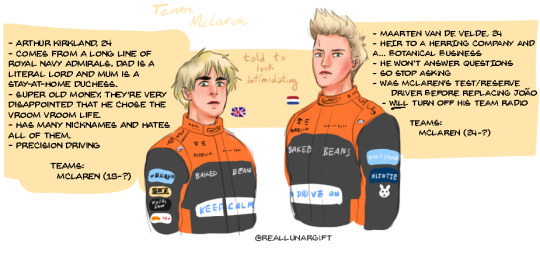
so uh.... vroom vroom Formula 1 AU?? Some notes on some of the latest team lineups! João left McLaren after 4 years, and Maarten will finally make his F1 debut alongside Arthur. Meanwhile Antonio left Renault after 2 years.
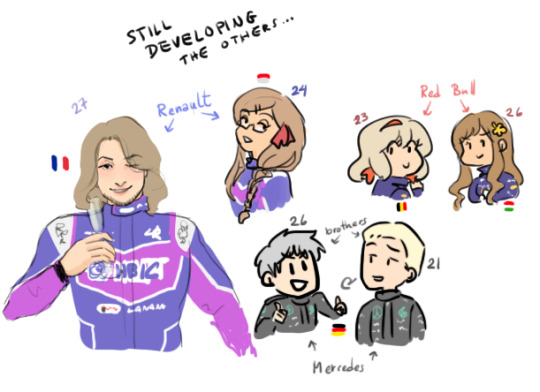
Francis has been at Renault for 5 years, and I need a name for Mona (Sophie? Suzanne? Michèle? Monica??) and Bel asap.
and because it's me.... you already know who I'll be focusing on more :')

This is a more introductory post, and I hope to draw actual interactions for the next one. But uhm well some more details under the cut for now, including previous and current team dynamics!
At the start of the story, João and Arthur are teammates at McLaren. Very calculating and strategic duo, they’ve been partners for 4 years. They’re polite with the press, with Arthur being more reserved. João is friendlier but more mellow and uses “no comment” often.
Their challenge videos on youtube show a different side, with Arthur being much more at ease and louder for it, and João being much more playful. They work great together, with João more often than not heeding team advice and driving defensively, which gets them plenty of 1-2 positions. But he eventually becomes disillusioned with McLaren’s favouritism and signs with Ferrari. His friendship with Arthur isn't affected by this move.
Toni and Francis are teammates at Renault (Alpine, but I'm not calling it that). Francis has a cleaner and more classic driving style, while Toni is more chaotic but just as ruthless.
They love their screentime and journalists love them. Francis is more deliberate in his answers yet still quite theatrical, while Antonio is more of a blabbermouth (but only with stuff that doesn’t matter. Ask him about technical/important stuff and he’ll divert the conversation to how good his family’s olive oil is.)
Their challenge videos are an extension of their interviews, with Francis being super dramatic for the camera when he loses, and Antonio being very extra to entertain the audience. They have a good racing partnership when they agree on strategy, but that doesn’t happen often and both are so set in their ways that it creates friction and issues for the team when neither will yield.
Ferrari hires João and Antonio because they’re both world class drivers, but also because they believe their styles and personalities will meld well. João has a reputation for strong teamwork and strategical driving, courtesy of his time at McLaren. Outwardly he seems less abrasive than Francis, so they expect that Toni will naturally be more willing to cooperate with him for the team’s benefit. Toni has always been very encouraging of his teammates throughout his career (especially at Red Bull when he was partners with Bel), and it’s hoped that this will also push João forward.
A great strategy...if these two get along. While driving for different teams they always take jabs at each other during interviews (João’s famous “no comment” goes right out the window anytime Toni’s done something stupid on the track). The usually sunny Toni gets huffy with reporters if they mention it, but always ends up taking the criticism into account and working on those aspects...
.
.
#vroom vroom au#my art#hws portugal#aph portugal#aph spain#hws spain#aph england#hws england#aph netherlands#hws netherlands#carnation pair#spaport#lads i am....gonna actually get up to watch a race next weekend....what the hell....who am i.....#i wanted to make them rich for the most ridiculous reasons#almost made Arthur's mum an heiress to heinz baked beans but that's american
142 notes
·
View notes
Text
max's november 2023 reads
so many online articles this month. which is maybe why i feel like i'm making 0 progress on my hard copy books. in december i'll need to reprioritize, it seems. i also wrote next to nothing this month, which probably explains why i read so many online articles.
fiction
Edmund Spenser's Faerie Queene, books 5-6
the latter half of Lavinia by Ursula K. Le Guin (again)
Shakespeare's Richard III (again, + i started Linda Charnes' Notorious Identity)
Gregor and the Curse of the Warmbloods by Suzanne Collins (review)
Gregor and the Marks of Secret by Suzanne Collins (review)
Vergil's Georgics, book 3
i continue to chug away at asoiaf #3 but god knows it is neverending
nonfiction
Getting Involved and Staying Regulated by Devon Price
(↳ on finding your place in the fight for palestinian liberation)
The Carrier Bag Theory of Fiction by Ursula K. Le Guin
(↳ on the patriarchal domination of the war narrative, and our other options)
The Cool Kid's Philosopher by Nathan J. Robinson
(↳ on Ben Shapiro)
Propaganda 101: How To Defend A Massacre by Nathan J. Robinson
(↳ on biased reporting, using the I/P conflict as an example, though this is from 2018 rather than recent)
A Guide For High School Students On How To Avoid Propaganda by Nathan J. Robinson
(↳ what the title says; i found it useful despite not being in high school anymore)
the latter half of Laziness Does Not Exist by Devon Price (review)
What Do We Do with the Art of Monstrous Men? by Clare Dederer
(↳ found this one rather disappointing. i like the start, but the gender takes feel lukewarm and imo there's not enough emphasis on the structural vs. individual. this is a nice counterpoint)
Physical Destruction in Whole or in Part by Saree Makdisi
(↳ "What we’re witnessing in Gaza, in other words, is not self-defense; it is an opportunistic offensive. It is not a “war,” the word used mendaciously and misleadingly by most of the mainstream Western press; it is a campaign of genocidal violence.")
the first chapter of Open Veins of Latin America by Eduardo Galeano
the first two chapters of The Great White Bard: How To Love Shakespeare While Talking About Race by Farah Karim-Cooper
a close read of my MFA statement of purpose by Brandon Taylor
(↳ on goals, responsibilities, and fictions)
On Mental Hospitals by Ozy Brennan
(↳ this is pretty short but very worth it)
How An Algorithm Feels From Inside by Eliezer Yudkowsky
(↳ on the psychology of the tree-falls-in-a-forest question)
Scrupulosity Sequence #3: Load-Bearing Things by Ozy Brennan
(↳ posts i am clinging to with my fingernails)
Why Are AMAB Trans People Denied The Closet? by Julia Serano
(↳ on "gendered socialization" and closeted transfemininity)
Trans Masc Misogyny and the Red Six of Spades by Jude Ellison S. Doyle
(↳ "No-one is ever actually a man. Everyone is always in the act of proving they’re a man, first by dominating women and children, then by dominating other men, establishing higher and higher rungs of man-ness until at the end, presumably, the one Real Man in existence gets to be in charge of everyone and everything else.")
Henry Kissinger, War Criminal Beloved By America's Ruling Class, Finally Dies by Spenser Ackerman
(↳ clicked for the title, stayed for the comprehensive and vicious takedown of kissinger's crimes)
#max.txt#readings#i also read some fanfiction but that's between me and god.#if you're wondering how i have the time for this i don't. i should be writing. i also don't talk to anyone
13 notes
·
View notes
Text
Here's my list of forgotten/cool women from history. Please take it, reblog it with more, spread it, learn about them, make books about them:
Lucy (slave used for experimentations on the uterus)
Nightwitches from WW2
Grace Hopper
Mary Anning
Maria Mitchell
Ada Lovelace
Kate Warne
Agnes Barre
Flora Tristan
Olympe de Gouges
Eleanor Roosevelt
Bessie Smith
Sylvia Plath
Sweet Tee
Lady D (the rapper)
The Sequence
Lady B
Rachel Carson
Baya
Tahireh
Lalla Fatma N'Soumer
Rosalind Franklin
Miriam Makeba
Alexandra David Néel
Suzanne Noël
Helena Rubinstein
Katherine Switzer
Jeanne Barret
Sophie Germain
Katherine Johnson
Margaret Hamilton
Hedy Lamarr
Betty Snyder Holberton
Kathleen McNulty Mauchly Antonelli
Marilyn Wescoff Meltzer
Frances Bilas Spence
Ruth Lichteman Teitelbaum og Jean Jennings Bartik
Valerie Thomas
Karen Sparck Jones
Dr Shirley Ann Jackson
Radia Perlman
Stacy Horn
Dr Betty Harris
Beulah Louise Henry
Elizabeth "Jake" Feinler
Empress Zenobia of the Palmyrene Empire
Surya Bonaly
Dolly Parton
Mary Wollstonecraft
Mary Shelley
Queen Nzinga of Ndongo Kingdom
Queen Yaa Asantewa Ashanti
Empress Candace of Ethiopia
Queen Sarraounia Mangou of Aznas Kingdom
Dona Beatriz
Mileva Marić
Matoaka
Janet Sobel
Claudette Colvin
Marsha P. Johnson
Marian Anderson
Madam CJ Walker
Frida Kahlo
Mirka Mora
Dahomey Amazons
The 40 Elephants
Diamond Alice
Maggie Bailey
Julie d'Aubigny
Bessie Coleman
Policarpa Salavarrieta
Annie Oakley
Anna Julia Cooper
Sojourner Truth
Ida B. Wells
Shirley Chisholm
Mary Church Terrell
Audre Lorde
Harriet Tubman
Maria W. Stewart
Angela Davis
Florynce Kennedy
Jocelyn Bell
Alice Ball
Lise Meitner
Chien Shiung Wu
Marie Tharp
Elizabeth Blackwell
Amanirenas
Wu Zetian
23 notes
·
View notes
Text
my girl @ronniebox tagged me and so here we go!
Rules: List ten books that have stayed with you in some way, don’t take but a few minutes, and don’t think too hard - they don’t have to be the “right” or “great” works, just the ones that have touched you.
Good Omens by Terry Pratchett and Neil Gaiman - my mother gave me this book to read when I was maybe 11, it was her copy that she had bought when Pratchett came and gave a reading at our local library in like, 1992. I'd say no book has been more formative to me, but in writing this I don't think thats true.
The City and the City by China Mieville - I got into Mieville through my girl @crimeandcricket, and was horribly traumatised by the body horror in perdido street station, and was way too influenced by his often pretentious writing style, but the city and the city is a masterpiece I'll never recover fully from and changed me for the better.
The Children's Hospital by Chris Adrian - I'm fairly sure no one but me loves this book, but it is also a book that multiple people stopped me when I was reading in public just from the cover image. My favourite kind of book is a book that can only be written by one person, and Adrian is a theologian and paediatrician, and this book uses every single one of his hyperfixations and also made me cry more than anything else.
The Phantom Tollbooth by Norton Juster - Actually, this book probably did more to calcify my sense of humour than Pratchett did. The smartest, funniest, coolest children's book ever, and this has reminded me to get the tattoo of Tock on my wrist.
Ballet Shoes by Noel Streatfield - I read this every christmas morning as a treat to myself. I also adore White Boots, the ice skating book, but Ballet Shoes is such a perfect gem of a story that is the favourite of my grandmother, my mother and myself.
Shabanu/Daughter of the Wind by Suzanne Fisher Staples - The first book that made me cry, inspired my fondness for camels and was probably my first feminist awakening? I've only read one of the sequels, but it was so brutal I still haven't emotionally recovered entirely.
The Amateur Cracksman by E. W Hornung - my mastermind specialist subject, a book that consumed me across time and space, Raffles my beloved, Bunny my beloved, I remember the moment I read the first story and my life changed literally forever. The Black Mask and A Thief In The Night are also obviously amazing and really all three should be considered one book, but something in my life changed for the better when I read the line 'AJ Raffles would be my friend!' in The Ides of March and I realised oh no, they're mine now.
Exhalation by Ted Chiang - very hard for me to choose a Ted Chiang story so thankfully I will pick his second collection, which has The Life Cycle of Software Objects and also the one about the parrots. It does not have Hell is the Absence of God or stories of your life, but tbh, software objects was the first of his stories I ever read, so it deserves to be here, even if it guts me like a fish every time.
Rivals by Jilly Cooper - if I could have anyone's writing career, it would be Jilly Cooper's. Everytime I read this insane soap opera of a book it holds me hostage until I finish it, and its like 700 pages long. The most wonderfully 80s OTT sex farce about horrible people trying to buy an ITV franchise. I genuinely can't believe that disney plus are making it into a series.
The Years of Rice and Salt by Kim Stanley Robinson - One of his least famous books and yet I think his best? I had read the Mars books several times before I picked this up, but this alternate history where 90% of Europe are killed by the black death, following how world history changes through the eyes of characters who reincarnate but always find each other, somehow??? it grabbed me by the throat and never let go.
tell me YOUR formative texts pls @crimeandcricket @deputychairman @myth-blossom @skylightpirate @stickthisbig @apricotbones @postalninja @cajunandfire @within-infant-rind
14 notes
·
View notes
Note
What do you think Suzanne’s view of Lilith is like? Do they have a good relationship? It’s like… I’m just wondering if Suzanne is low-key glad Lilith didn’t get the halo even though she’s next-in-line because she sees shades of her younger, brash and impatient self in her. Like, of course she would not want a repeat of that disaster and become the next Mother Superion to die because the halo-bearer is high on halo-induced power.
Hello!
As with the previous question I received, dear anon, yours demands that we tread slowly, for the show provides no direct answer to your query and we must dig it out of whatever information we do possess. We will, therefore, proceed in parts, building our interpretation as we go, attempting to base it on as much of the source material and on as little fancy as we can.
(beware, this is an image-heavy post!)
a) On Suzanne's view of Lilith as an individual
If there is one constant in Suzanne's character, it is her utter devotion to the women of the OCS; hiding it beneath layers of sternness or expressing it openly, that never changes within her. Whatever her own obscure objections to Ava when she first arrives at the Cat's Cradle, this unwilling halo bearer who rejects "the gift" Mother Superion had been denied, the nun's aversion to the newcomer is also tied to Ava's seeming contempt and disinterest for the girls she so loves and for their mission.
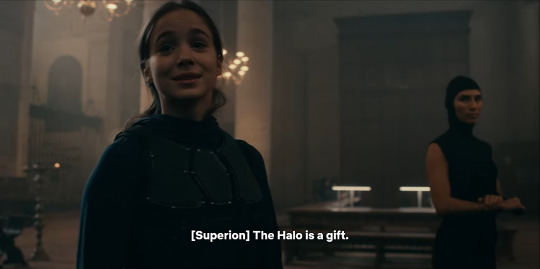
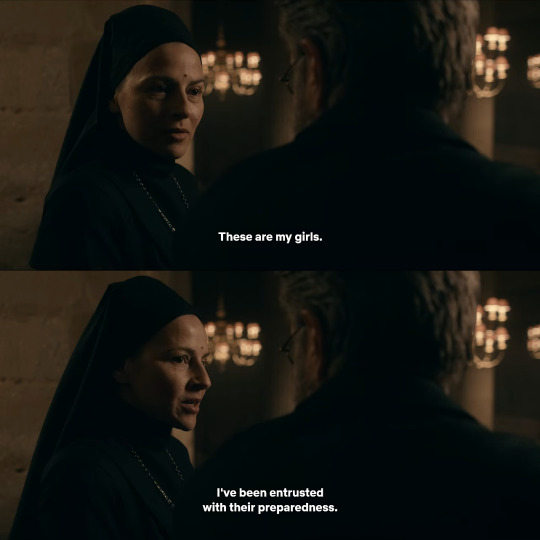

As it so happens, Lilith is among this select group of women under Mother Superion's wing. This alone would be enough to place her somewhere in Suzanne's good graces, but we also see Lilith "team up" with her in antagonising Ava at her first arrival. They complement one another, encircling, trapping Ava between them, as a hunter and a trusted hound cornering prey.
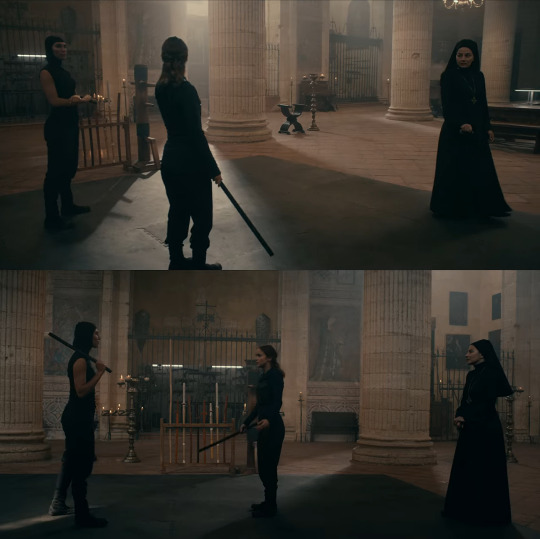
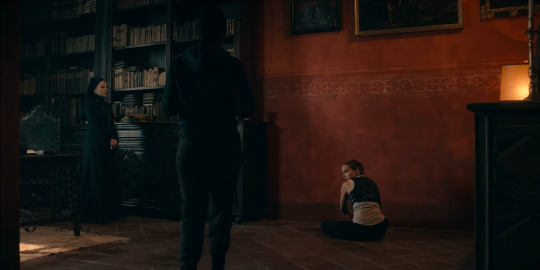
This cooperation, as despicable and unfair as it might be to us, betrays a convergence of values — to what degree, exactly, we cannot tell, but they are quite clearly on the same side, seeking a common goal.
Now, Lilith has probably never received a more maternal type of affection from our then emotionally stunted "Cruella de Jesus", but some level of approbation is highly likely. Association alone would have garnered her as much, but there is also the question of devotion to the cause that they both share and which we know is of the greatest importance to Suzanne.
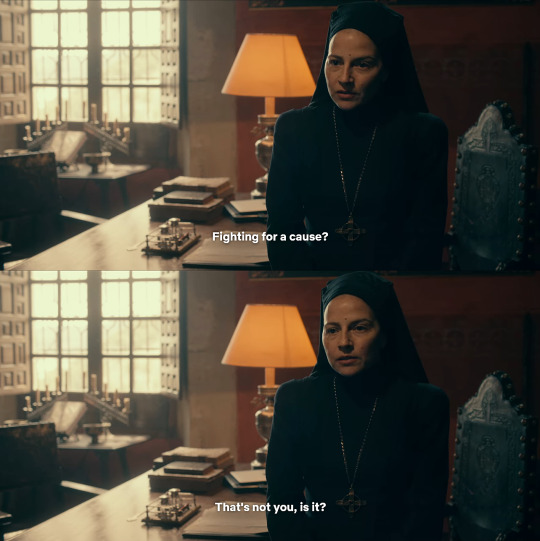
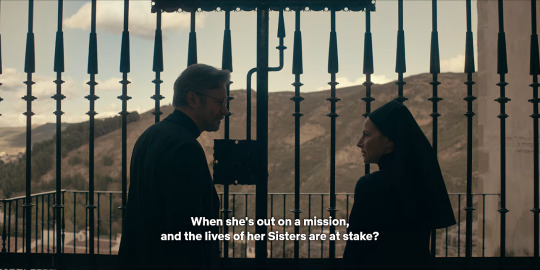

Whether Mother Superion (or even Lilith herself) can at this point tell what the real motivation behind such devotion is has not the greater relevance of the fact that it is there — if Lilith truly believes in divine calling or if she's only trying to be loved by mummy dearest doesn't affect the end result that is her dedication. Even Suzanne's own reasons when she was halo bearer aren't necessarily clear to us; we know only that these are women with a drive and that this unites them for now.
Dedication, then, brings us to our second point:
b) On Suzanne's view on Lilith as halo bearer to be
Lilith is competent, skilled, prepared. Nobody denies that.
Yet it isn't a secret that she has a few character flaws one wouldn't usually expect from a nun, warrior or otherwise, and as much as she might have tried to hide these traits from her superiors, we know there is at least one less than ideal demonstration of them that Suzanne witnesses — and halts herself.
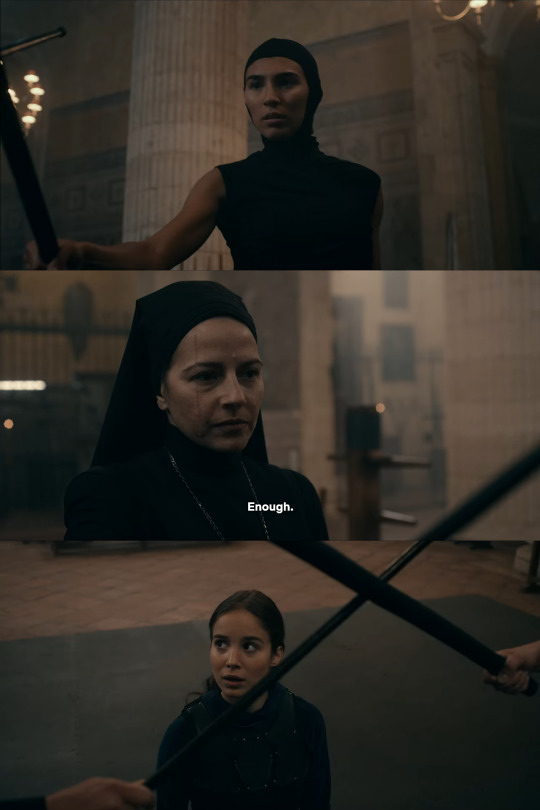
Simon has spoken of how father Vincent and Mother Superion oversaw the operations of the OCS, so we could assume that Lilith as next in line was something they both agreed on...
However, two other details might raise questions about how organically she gained such a position. First, Beatrice's recalling "the politics" of denying Lilith the halo as Vincent intended to do and, second, Duretti's involvement and insistence that all be done to ensure Lilith succeeded Shannon at once.

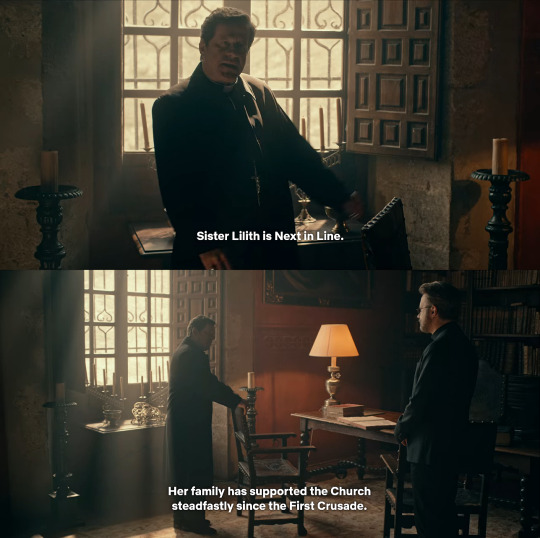
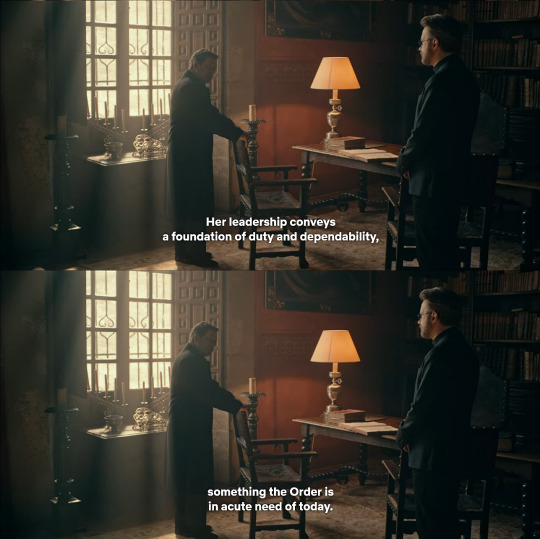
This could indicate exterior pressure for Vincent and Suzanne to nominate Lilith as next in line.
Which isn't to say Lilith didn't have the chops — it might just not have been the appropriate time, especially considering how easily she might give in to certain provocations tied to vanity. Arrogance, when belched out too frequently, is a marker of self-esteem issues rather than confidence — among other examples, Lilith's clear distress at being called "heartless" by Mary shows us just how dependent on other people's opinions she is, how vulnerable, even immature in a way.
The pride young Suzanne displayed and the one shown by Lilith appear to be of two very different origins: the former was cocky because she seemed to already know what she was worth (and so the halo's rejection later on stings even harder), whereas the latter is still searching. Lilith trains harder than anyone else because she is more lost than anyone else; to her, perhaps the halo might just buy her a mother as well as an identity.
Maybe these different natures of "pride" are also what allowed Lilith to be chosen despite any reservations Mother Superion might have had based on her attitude (if in fact she and Vincent had a say in it). Moreover, Lilith does appear to be more of a team player than young Suzanne ever was: feeling annoyed at how Ava leaves her behind during the "test", stepping in front of the tarask, heeding Beatrice's counsel at the catacombs instead of insisting...
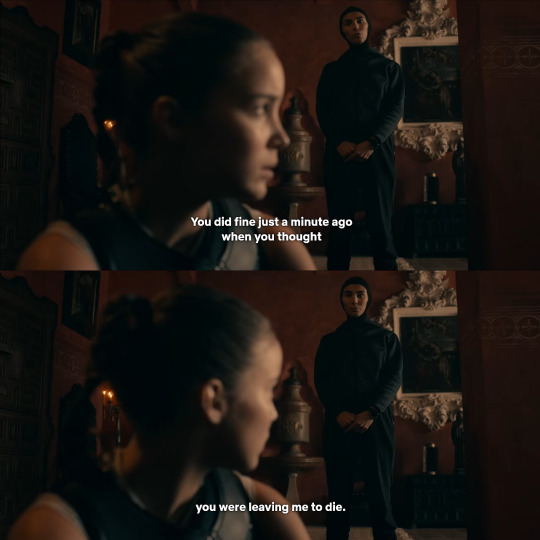
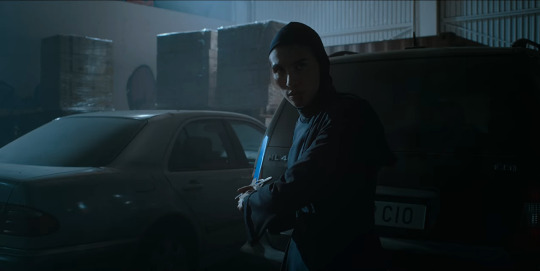
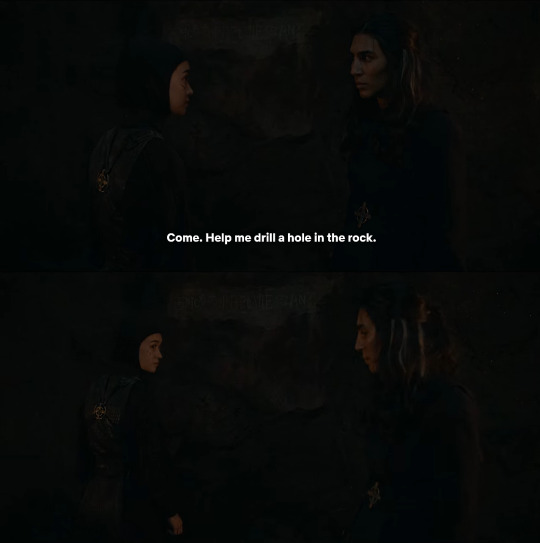
That's a far cry from how young Suzanne temporarily incapacitated one of her own sisters before marching gloriously into her own downfall.
Would Lilith have acted differently had she been carrying the halo? We can't tell, it would all be conjecture. From what we've seen, for the most part, this Lilith we know would, as Beatrice would say, trust her team.
For that reason, leaving aside any wild speculation on what would have happened had Lilith been the warrior nun to free Adriel (if that would have even happened at all), I think Mother Superion had as good a relationship with her as either personality could allow for.
Then again, we know that Lilith's path deviates entirely from all that had been planned out for her and thus we arrive at:
c) Season two
It's unnecessary to recall how the two characters in question didn't really interact with one another in the course of these eight episodes, so this section will be short because from here on out we're on our own trying to decipher the nature of Suzanne's current perspective on Lilith.
One thing we learn for sure is that she ends the season rather contented and proud of Ava as the warrior nun — it's with her that she has found common ground now, it's with her that she shares common values.

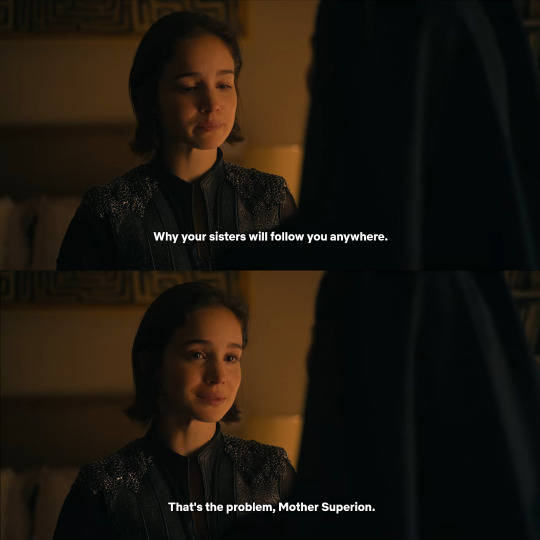

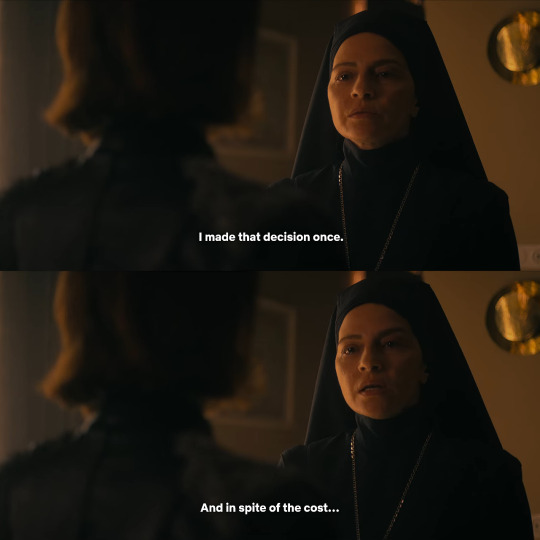

Lilith, on the other hand, had started out without checking in with the nuns and ends up going out on her own, lonely way. Where once she exulted in following directives (at least when Duretti not so subtly gives her the green light to rip the halo from Ava's back...), now anything of the sort is odious to her.


Nobody would dream of considering Lilith for halo bearer in the odd chance something happened to Ava, regardless of whatever feelings might linger; she has betrayed the Order.
Given her recent conduct, Lilith might have lost her status and even, perhaps, the respect Suzanne had for her. Then again, at least for the time being, none of this is a priority for her; all of those things that had previously served to point her out as the next logical halo bearer, those things that chained her to an existence she probably had little say in, have been left behind. She might not know precisely who she is or what she wants yet, but the burden of carrying her family's legacy (and damned be her own desires) is gone.


There has been a rupture between them, yes — and it is not necessarily caused by the brashness once exhibited by both.
Instead, I think maybe Lilith's shirking of that vital principle that Suzanne values most of all, that sisterhood that justifies her devotion and defines her very core, would upset Mother Superion and make her glad that Lilith did not get the halo in the end more than anything else. That drive which united them is shattered now that Lilith treads a solitary path her own altered biology seems to claim for itself, whilst Suzanne is more than ever attuned to the importance of her community/communion of women.
That, I'd say, would justify any "satisfaction" with how things turned out — for how truly satisfied can you be when one of your own turns her back on you?
#warrior nun#mother superion#sister lilith#chats with anon#correspondence#i hope waiting an entire week for this was worth it anon i am sorry if not hjfdhjfd#i've spoken enough so i shall now be silent :x#analysis and similar#exercises in observation
18 notes
·
View notes
Text
2023 Oscars Trivia (Post-Ceremony)
Like last year, the Best Picture winner had a big night: Oppenheimer won 7 awards, as did Everything Everywhere All at Once. This post will use the word "consecutive" a lot.
This is the second consecutive year that a film won 7+ awards. The last time that happened was 1996-1998 (The English Patient; Titanic; Shakespeare in Love).
This is the second consecutive year that a film has won multiple acting awards. The last time that happened was 2003 & 2004 (Mystic River and Million Dollar Baby). The only other time consecutive Best Picture winners won multiple acting awards was 1953 & 1954 (From Here to Eternity and On the Waterfront).
Four consecutive Best Picture winners have won for acting, the longest streak since 1998-2002.
Oppenheimer is the first film since The Artist (2011) to win both Best Picture and Best Actor.
Oppenheimer is the 6th film to win both male acting awards and the first since Dallas Buyers Club (2013). The last Best Picture winner to win both male acting awards was Ben-Hur (1959).
Three of this year's acting winners have starred in superhero films: Emma Stone was Gwen Stacy in The Amazing Spider-Man, Cillian Murphy was Scarecrow in the Nolan Batman movies, and Robert Downey Jr., of course, is Iron Man.
Oppenheimer is the highest-grossing Best Picture winner since The Lord of the Rings: The Return of the King (2003).
Three Best Picture nominees went home empty-handed: Killers of the Flower Moon, Maestro, and Past Lives.
Killers of the Flower Moon is the third Scorsese film to receive 10 nominations and 0 awards (Gangs of New York, 2002; The Irishman, 2019).
Diane Warren continues to hold the record for most Original Song nominations without a win (15) and continues to be the woman with the most Oscar nominations without a win. She has lost six in a row.
Bradley Cooper is now tied for 8th place among individuals with the most nominations without a win (12).
Despite several nominations -- Martin Scorsese and Robert De Niro for Killers of the Flower Moon, and Matteo Garrone's Io Capitano for International Feature -- none of the men behind Goncharov took home an Oscar.
This is the 8th consecutive year with at least one black winner, extending the record.
Da'Vine Joy Randolph is the 10th black woman to win Best Supporting Actress -- the first acting category to hit double digits.
This is the fourth consecutive year with at least one non-white acting winner (Michelle Yeoh and Ke Huy Quan in 2022; Will Smith and Ariana DeBose in 2021; Daniel Kaluuya and Youn Yuh-jung in 2020) -- the longest streak ever.
Cord Jefferson is the 8th black screenplay winner, and this is the 6th such win (all but one were for Adapted Screenplay).
This is the fourth year in a row that a woman has won a screenplay award (Justine Triet for Anatomy of a Fall, Sarah Polley for Women Talking, Sian Heder for CODA, Emerald Fennell for Promising Young Woman) -- the longest streak ever.
Both screenplay wins were the only wins for their films, and both wins included the film's director. This is the 9th year in a row that a director has won for Original Screenplay, and the 6th year in a row for Adapted Screenplay; both are records.
Kiyoko Shibuya is the third woman and first woman of color to win for Visual Effects (Suzanne M. Benson for Aliens, 1986; Sara Bennett for Ex Machina, 2015).
Neil Corbould, nominated for The Creator, Mission: Impossible - Dead Reckoning Part I, and Napoleon, is the first person to lose for Visual Effects three times in one year (don't worry, he's already won twice).
Billie Eilish (22) and Finneas O'Connell (26) are the youngest people to win multiple Oscars ("No Time to Die" from No Time to Die, 2021).
At 35, Emma Stone is the 8th-youngest person and woman to win two acting Oscars, and the 7th-youngest to win Best Actress twice.
Cillian Murphy is the first Irish Best Actor winner.
Christopher Nolan was the only individual to win multiple awards (Picture and Director).
Christopher Nolan is the first white man to win Best Director solo since Damien Chazelle (La La Land, 2016). Including Daniel Scheinert for Everything Everywhere All at Once, this is the first time since 2010 & 2011 that white men have won Best Director in consecutive years (Tom Hooper for The King's Speech; Michel Hazanavicius for The Artist), and that consecutive Best Picture winners have had a white male director.
The Zone of Interest is the first film from the United Kingdom to win Best International Feature. It is the fifth Best Picture nominee in six years to win in this category, and the third in a row (Drive My Car and All Quiet on the Western Front).
20 Days in Mariupol is the first Ukrainian film to win an Oscar.
Takashi Yamazaki is the second director to win for Visual Effects (Stanley Kubrick for 2001: A Space Odyssey, 1968).
Godzilla Minus One is the first Godzilla film to win an Oscar and the first Japanese film to win for Visual Effects (Tora! Tora! Tora!, 1970, was an American-Japanese co-production). Previously, the only Asian Visual Effects winner was Taiwanese-American Doug Chiang (Death Becomes Her, 1992).
This is the second time that only one non-Best Picture nominee won in a main category (i.e. excluding Animated, Documentary, International, shorts). The other time was 1997 (Best Makeup for Men in Black); notably, that was the year Titanic tied the record for most awards.
This is the second year in a row that the most-nominated film a) won Best Picture and b) won the most awards of the night. The last time consecutive most-nominated films won the most awards was 2016 & 2017 (La La Land and The Shape of Water); the last time consecutive most-nominated films won Best Picture was 2009 & 2010 (The Hurt Locker and The King's Speech).
This is the second consecutive year that multiple films have won 4+ awards (Everything Everywhere All at Once and All Quiet on the Western Front). The last year with multiple 4+ winners was 2014 (Birdman and The Grand Budapest Hotel), and the last time it happened consecutively was 2010 & 2011 (The King's Speech and Inception; The Artist and Hugo).
This is the third consecutive year that three or fewer films have won multiple awards, the longest streak since 1956-1960.
Two couples shared wins: Christopher Nolan & Emma Thomas for Best Picture, and Justine Triet & Arthur Harari for Original Screenplay.
Christopher Nolan & Emma Thomas are the third couple to share a Best Picture win (Richard D. Zanuck & Lili Fini Zanuck, Driving Miss Daisy, 1989; Peter Jackson & Fran Walsh, The Lord of the Rings: The Return of the King, 2003).
Justine Triet & Arthur Harari are the third couple to win for Original Screenplay (Muriel & Sydney Box, The Seventh Veil, 1946; Earl W. & Pamela Wallace, Witness, 1985).
Toshio Suzuki is the second Asian winner of Animated Feature, and Hayao Miyazaki is the first Asian to win twice (Spirited Away, 2002).
The Boy and the Heron and Spirited Away are the only two hand-drawn animated films and the only two non-English-language films to win Animated Feature.
Pixar has lost Animated Feature three years in a row, its longest drought ever.
Holly Waddington is the first person since Mark Bridges (The Artist, 2011) to win Best Costume Design for her first nomination.
#oscars project 2023#oscars trivia#apparently i'm into streaks this year#and the award for most consecutive uses of consecutive goes to...
2 notes
·
View notes
Text
patti smith, matthias grunewald, sylvia plath, john singer, toni morrison, frida kahlo, gina pane,, oscar wilde, el greco, george struikelblok, tracey emin, mark rothko, julia margaret cameron, jung boc su, ron athey, andrea mantegna, seamus heaney, nico, gustav mahler, paula rego, diane arbus, arvo part, bob flanagan, leonard cohen, ahn chang hong, francisco goya, nina simone, ulay, susan sontag, marina abramovic, edith piaf, edvard munch, louise bourgeois, beth gibbons, ian curtis, raimund hoghe, antony hegarty, maria callas, samuel barber, gunter bruce, francis bacon, arthur rimbaud, kae tempest, mike parr, david nebreda, pier paolo pasolini, sam fender, nick cave, ana mendieta, christian boltanski, leon golub, fabio mauri, david olusoga, kiki smith, maya angelou, hieronymus bosch, bobby baker, janis joplin, nan goldin, andrei tarkovsky, bob dylan, abel ascona, nancy spero, billie holiday, robert capa, sarah lucas, friedrich nietzsche, sonia boyce, steve mcqueen, fabrizio de andre', alda merini, letizia battaglia, nick drake, charles bukowski, iannis xenakis, rogier vander weyden, janine antonii, arvo parks, tracy chapman, jean genet, valie export, linda mary montano, william blake, john cooper clarke, hannah wilke, lou reed, tracey moffat, doris salcedo, rebecca horn, giacomo leopardi, santiago sierra, teresa margolles, regina jose' galindo, suzanne lacy
12 notes
·
View notes
Photo
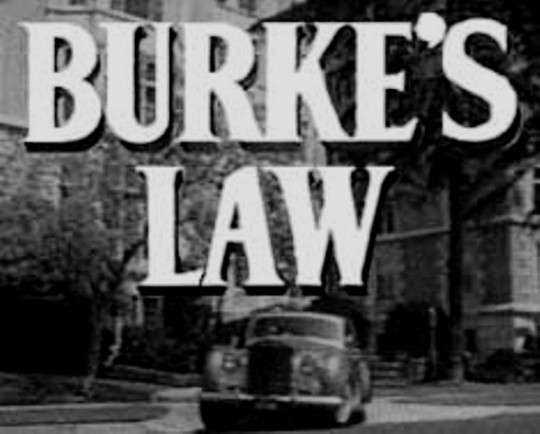

Burke’s Law - List of Guest Stars
The Special Guest Stars of “Burke’s Law” read like a Who’s Who list of Hollywood of the era. Many of the appearances, however, were no more than one scene cameos. This is as complete a list ever compiled of all those who even made the briefest of appearances on the series.
Beverly Adams, Nick Adams, Stanley Adams, Eddie Albert, Mabel Albertson, Lola Albright, Elizabeth Allen, June Allyson, Don Ameche, Michael Ansara, Army Archerd, Phil Arnold, Mary Astor, Frankie Avalon, Hy Averback, Jim Backus, Betty Barry, Susan Bay, Ed Begley, William Bendix, Joan Bennett, Edgar Bergen, Shelley Berman, Herschel Bernardi, Ken Berry, Lyle Bettger, Robert Bice, Theodore Bikel, Janet Blair, Madge Blake, Joan Blondell, Ann Blyth, Carl Boehm, Peter Bourne, Rosemarie Bowe, Eddie Bracken, Steve Brodie, Jan Brooks, Dorian Brown, Bobby Buntrock, Edd Byrnes, Corinne Calvet, Rory Calhoun, Pepe Callahan, Rod Cameron, Macdonald Carey, Hoagy Carmichael, Richard Carlson, Jack Carter, Steve Carruthers, Marianna Case, Seymour Cassel, John Cassavetes, Tom Cassidy, Joan Caulfield, Barrie Chase, Eduardo Ciannelli, Dane Clark, Dick Clark, Steve Cochran, Hans Conried, Jackie Coogan, Gladys Cooper, Henry Corden, Wendell Corey, Hazel Court, Wally Cox, Jeanne Crain, Susanne Cramer, Les Crane, Broderick Crawford, Suzanne Cupito, Arlene Dahl, Vic Dana, Jane Darwell, Sammy Davis Jr., Linda Darnell, Dennis Day, Laraine Day, Yvonne DeCarlo, Gloria De Haven, William Demarest, Andy Devine, Richard Devon, Billy De Wolfe, Don Diamond, Diana Dors, Joanne Dru, Paul Dubov, Howard Duff, Dan Duryea, Robert Easton, Barbara Eden, John Ericson, Leif Erickson, Tom Ewell, Nanette Fabray, Felicia Farr, Sharon Farrell, Herbie Faye, Fritz Feld, Susan Flannery, James Flavin, Rhonda Fleming, Nina Foch, Steve Forrest, Linda Foster, Byron Foulger, Eddie Foy Jr., Anne Francis, David Fresco, Annette Funicello, Eva Gabor, Zsa Zsa Gabor, Reginald Gardiner, Nancy Gates, Lisa Gaye, Sandra Giles, Mark Goddard, Thomas Gomez, Pedro Gonzalez Gonzalez, Sandra Gould, Wilton Graff, Gloria Grahame, Shelby Grant, Jane Greer, Virginia Grey, Tammy Grimes, Richard Hale, Jack Haley, George Hamilton, Ann Harding, Joy Harmon, Phil Harris, Stacy Harris, Dee Hartford, June Havoc, Jill Haworth, Richard Haydn, Louis Hayward, Hugh Hefner, Anne Helm, Percy Helton, Irene Hervey, Joe Higgins, Marianna Hill, Bern Hoffman, Jonathan Hole, Celeste Holm, Charlene Holt, Oscar Homolka, Barbara Horne, Edward Everett Horton, Breena Howard, Rodolfo Hoyos Jr., Arthur Hunnicutt, Tab Hunter, Joan Huntington, Josephine Hutchinson, Betty Hutton, Gunilla Hutton, Martha Hyer, Diana Hyland, Marty Ingels, John Ireland, Mako Iwamatsu, Joyce Jameson, Glynis Johns, I. Stanford Jolley, Carolyn Jones, Dean Jones, Spike Jones, Victor Jory, Jackie Joseph, Stubby Kaye, Monica Keating, Buster Keaton, Cecil Kellaway, Claire Kelly, Patsy Kelly, Kathy Kersh, Eartha Kitt, Nancy Kovack, Fred Krone, Lou Krugman, Frankie Laine, Fernando Lamas, Dorothy Lamour, Elsa Lanchester, Abbe Lane, Charles Lane, Lauren Lane, Harry Lauter, Norman Leavitt, Gypsy Rose Lee, Ruta Lee, Teri Lee, Peter Leeds, Margaret Leighton, Sheldon Leonard, Art Lewis, Buddy Lewis, Dave Loring, Joanne Ludden, Ida Lupino, Tina Louise, Paul Lynde, Diana Lynn, James MacArthur, Gisele MacKenzie, Diane McBain, Kevin McCarthy, Bill McClean, Stephen McNally, Elizabeth MacRae, Jayne Mansfield, Hal March, Shary Marshall, Dewey Martin, Marlyn Mason, Hedley Mattingly, Marilyn Maxwell, Virginia Mayo, Patricia Medina, Troy Melton, Burgess Meredith, Una Merkel, Dina Merrill, Torben Meyer, Barbara Michaels, Robert Middleton, Vera Miles, Sal Mineo, Mary Ann Mobley, Alan Mowbray, Ricardo Montalbán, Elizabeth Montgomery, Ralph Moody, Alvy Moore, Terry Moore, Agnes Moorehead, Anne Morell, Rita Moreno, Byron Morrow, Jan Murray, Ken Murray, George Nader, J. Carrol Naish, Bek Nelson, Gene Nelson, David Niven, Chris Noel, Kathleen Nolan, Sheree North, Louis Nye, Arthur O'Connell, Quinn O'Hara, Susan Oliver, Debra Paget, Janis Paige, Nestor Paiva, Luciana Paluzzi, Julie Parrish, Fess Parker, Suzy Parker, Bert Parks, Harvey Parry, Hank Patterson, Joan Patrick, Nehemiah Persoff, Walter Pidgeon, Zasu Pitts, Edward Platt, Juliet Prowse, Eddie Quillan, Louis Quinn, Basil Rathbone, Aldo Ray, Martha Raye, Gene Raymond, Peggy Rea, Philip Reed, Carl Reiner, Stafford Repp, Paul Rhone, Paul Richards, Don Rickles, Will Rogers Jr., Ruth Roman, Cesar Romero, Mickey Rooney, Gena Rowlands, Charlie Ruggles, Janice Rule, Soupy Sales, Hugh Sanders, Tura Satana, Telly Savalas, John Saxon, Lizabeth Scott, Lisa Seagram, Pilar Seurat, William Shatner, Karen Sharpe, James Shigeta, Nina Shipman, Susan Silo, Johnny Silver, Nancy Sinatra, The Smothers Brothers, Joanie Sommers, Joan Staley, Jan Sterling, Elaine Stewart, Jill St. John, Dean Stockwell, Gale Storm, Susan Strasberg, Inger Stratton, Amzie Strickland, Gil Stuart, Grady Sutton, Kay Sutton, Gloria Swanson, Russ Tamblyn. Don Taylor, Dub Taylor, Vaughn Taylor, Irene Tedrow, Terry-Thomas, Ginny Tiu, Dan Tobin, Forrest Tucker, Tom Tully, Jim Turley, Lurene Tuttle, Ann Tyrrell, Miyoshi Umeki, Mamie van Doren, Deborah Walley, Sandra Warner, David Wayne, Ray Weaver, Lennie Weinrib, Dawn Wells, Delores Wells, Rebecca Welles, Jack Weston, David White, James Whitmore, Michael Wilding, Annazette Williams, Dave Willock, Chill Wills, Marie Wilson, Nancy Wilson, Sandra Wirth, Ed Wynn, Keenan Wynn, Dana Wynter, Celeste Yarnall, Francine York.
7 notes
·
View notes
Text
How did the Pre-Raphaelite Brotherhood become so famous? Did Elizabeth Siddal really almost die in a bathtub when she modelled for John Everett Millais' Ophelia? And which Rosetti painting shocked the art establishment the most? Speaking to Elinor Evans, Suzanne Fagence Cooper answers your questions on the Pre-Raphaelite Brotherhood: a group of artists founded in 1848 who pushed the boundaries of artistic realism and courted scandal in Victorian Britain through their lifestyles and art.
4 notes
·
View notes